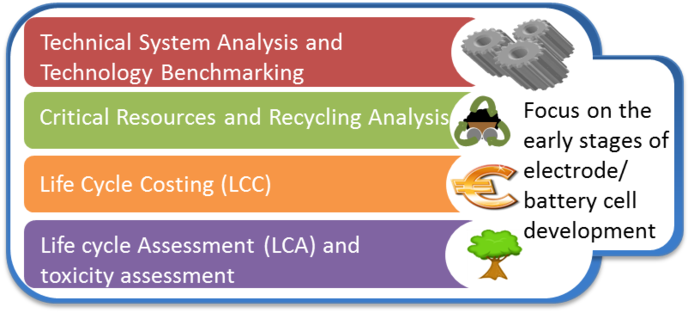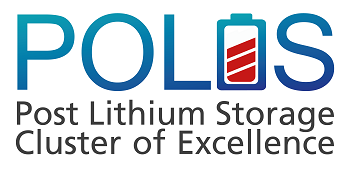HIU-Newsletter
You a scientist yourself? A journalist, a political decision-maker or business representative? In our newsletters we compile the latest battery research news for you. Specially tailored to your personal area of interest.
In the research group "Resources, Recycling, Environment & Sustainability" technical systems analysis converges with ecological and economic systems analysis. The goal is to take aspects of sustainability into account at the earliest possible point in time during the development phase of a battery system.
New forms of technology not only have to meet higher technical requirements or help to overcome technological hurdles, but also to positively influence or structure the different dimensions of sustainability (the economic, ecological, and social aspects). The research group supports the sustainable development of the technology needed for innovative electrochemical energy storage.
The topics at the focus of this work include the availability of resources (as a possible obstacle to innovation), environmental/toxicological factors, and the recycling of electrochemical traction batteries. One important goal, which is shared with the technology developers, is to take the aspects of sustainability into consideration even in the early design phase of battery systems. In doing this, a technical systems analysis is combined with an ecological and economic (social) one that is life-cycle related. This is supposed to make it possible to reach a deeper understanding with regard to the technical requirements, environmental impact, and economic feasibility of future battery systems.
Within the POLIS activities the research focus at present on the environmental, economic and social Life Cycle Assessment (LCA) of sodium and magnesium cell materials and cell systems. A special attention is paid on screening processes of sodium cathode materials and LCA of hard carbon materials from different precursor. In addition, PFAS free binder development is supported by sustainability evaluation for the identification of promising design corridors.


This research group is partially funded by the Deutsche Forschungsgesellschaft (DFG) through the Cluster of Excellence POLiS.
The Research Group for Resources, Recycling, Environment and Sustainability is responsible for the system analysis of energy storage systems through Life Cycle Assessment, Material Flow Analysis and related tools.
One major objective of the Research group is the cooperation with technology developers in order to incorporate sustainability aspects in the early development phases of battery systems. In this context technical system analysis is combined with life-cycle oriented environmental and economic system analysis.
This approach aims at creating a deeper understanding of the technological requirements, environmental impacts and economic feasibility of prospective battery systems.
By embedding sustainability aspects in the early technology design phase, potential innovation risks can be identified prospectively and minimized by appropriate measures. An essential task of our group is to provide relevant knowledge that can direct the development of battery systems towards the path of sustainability. Such knowledge can be used to support decision-making (e.g. selection of prospective anode materials).
Further activities prospectively examine potential value chains of selected future cell systems. Regarding the beginning of the chain, a potentially restricted future access to strategically important raw materials is considered as a possible obstacle for the introduction and success of technological innovations. For that reason we assess prospectively the availability of resources (e.g. lithium and transition metals) for the production of both traction batteries and stationary batteries.
Concerning the end of the chain, we also focus on the recyclability of electrochemical energy storage systems. Due to technical and economic reasons, current recycling technologies for batteries (most of which are still under development) do not recover all the materials from the battery cells (e.g. lithium is generally not recovered). A roadmap for this sector will help determine the technical, economic and environmental obstacles and identify ways to overcome these barriers. Furthermore, it has to be analyzed whether the recycling technologies currently under development are also suitable for novel cell systems developed by HIU, or if new or adjusted recycling technologies must be developed.
Regardless of the alternative, its economic and environmental effects will have to be assessed.
(information will be uploaded shortly)
Dr. Marcel Weil (Principal Investigator):
The Research Group for Resources, Recycling, Environment and Sustainability is responsible for the system analysis of energy storage systems through Life Cycle Assessment, Material Flow Analysis and related tools.
One major objective of the Research group is the cooperation with technology developers in order to incorporate sustainability aspects in the early development phases of battery systems. In this context technical system analysis is combined with life-cycle oriented environmental and economic system analysis.
This approach aims at creating a deeper understanding of the technological requirements, environmental impacts and economic feasibility of prospective battery systems.
By embedding sustainability aspects in the early technology design phase, potential innovation risks can be identified prospectively and minimized by appropriate measures. An essential task of our group is to provide relevant knowledge that can direct the development of battery systems towards the path of sustainability. Such knowledge can be used to support decision-making (e.g. selection of prospective anode materials).
Further activities prospectively examine potential value chains of selected future cell systems. Regarding the beginning of the chain, a potentially restricted future access to strategically important raw materials is considered as a possible obstacle for the introduction and success of technological innovations. For that reason we assess prospectively the availability of resources (e.g. lithium and transition metals) for the production of both traction batteries and stationary batteries.
Concerning the end of the chain, we also focus on the recyclability of electrochemical energy storage systems. Due to technical and economic reasons, current recycling technologies for batteries (most of which are still under development) do not recover all the materials from the battery cells (e.g. lithium is generally not recovered). A roadmap for this sector will help determine the technical, economic and environmental obstacles and identify ways to overcome these barriers. Furthermore, it has to be analyzed whether the recycling technologies currently under development are also suitable for novel cell systems developed by HIU, or if new or adjusted recycling technologies must be developed.
Regardless of the alternative, its economic and environmental effects will have to be assessed.
(information will be uploaded shortly)
Dr. Marcel Weil (Principal Investigator):
 Dr. Marcel Weil Resources, Recycling, Environment & Sustainability
Dr. Marcel Weil Resources, Recycling, Environment & SustainabilityORCID: 0000-0003-0151-9990
Scopus Author ID: 57040558700
KIT Subsite of Marcel Weil
You a scientist yourself? A journalist, a political decision-maker or business representative? In our newsletters we compile the latest battery research news for you. Specially tailored to your personal area of interest.